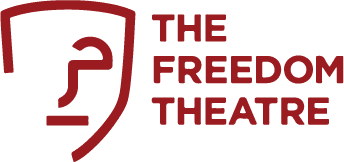Brothers and Sisters of the Land. I go now on my last journey. I must leave the light of day forever, for the Island, strange and cold, to be lost between life and death. So, to my grave, my everlasting prison, condemned alive to solitary death.
The Freedom Theatre’s brand new production is a revolutionary South African apartheid-era drama by Athol Fugard, John Kani and Winston Ntshona, inspired by a true story. The Island is set in a prison and revolves around two cellmates: one who is soon to be released while the other is serving a life sentence. They spend their days at mind-numbing physical labour and at night rehearse for a performance of Sophocles’ Antigone. Antigone, who defies the laws of the state to follow her conscience, and her uncle who sentences her to die for her crime. Is Antigone guilty? Who decides?
The Freedom Theatre’s adaptation of The Island reflects the experiences of Palestinian political prisoners and the abuses within the Israeli prison system. The play also highlights the parallels between apartheid South Africa and Palestine today. The separation, the denial of basic human and political rights, the discrimination and oppression that is evident in countless aspects of daily life.
The Island is directed by The Freedom Theatre’s Artistic Director Gary M. English who is also a Professor of Drama at the University of Connecticut in the United States: “The Island is political drama at its best with political ideas embedded within the characters and their experience. It is universal in its themes – including the tragedy of those who anyway in the world are unjustly imprisoned for purely political reasons, beliefs or for simply speaking out against injustice.”
This play sends a strong message to the outside world. “More or less the whole world was against apartheid in South Africa yet it’s still happening today, here in Palestine”, says Faisal Abu Alheja, resident actor at The Freedom Theatre, who plays the character Mukhtar.
To Faisal, The Island is essentially about cultural resistance. The prisoners are in a miserable situation, they are exhausted from hard labour, but still they spend their free time rehearsing Antigone. They want to make a play, an art festival even, because it’s important for the other prisoners – who represent everyone in Palestine, because we are all prisoners under the Israeli apartheid system.
“This is what we do here, in The Freedom Theatre. This gives us meaning. Despite the situation we are thirsty and this is the water to keep our souls, our minds alive, says Faisal. – Israel wants us to give up, to die, but we want to keep ourselves alive. This is a big message for our cultural identity, our human identity. We are staying alive.”
“Antigone is an important symbol”, says Ahmad Rokh, who plays Imam. “She did something against the rules and the court says she is guilty according to the law. But to people, to humanity, to God even, she is not. It’s the same with our political prisoners: they are guilty under Israeli law but to us they are heroes. Freedom fighters.”
The Freedom Theatre dedicates this play to Samer Issawi and all other Palestinian political prisoners.
Opening 7th of March @ 3 pm
Performances:
March 7 @ 3 pm, The Freedom Theatre
March 9 @ 3 pm, The Freedom Theatre
March 10 @ 3 pm, The Freedom Theatre
March 11 @ 4 pm, The Freedom Theatre
March 12 @ 3 pm, The Freedom Theatre
March 13 @ 4 pm, The Freedom Theatre
School performances March 11 and 13, The Freedom Theatre
Performances in Sweden: April 27 – May 3, 2013
Performances in Brazil: August 1 – 7, 2013
Performances in US: September, 2013
Read more about The Island
